|
|
|
Sort Order |
|
|
|
Items / Page
|
|
|
|
|
|
|
| Srl | Item |
| 1 |
ID:
137644
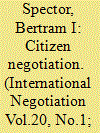

|
|
|
|
|
| Summary/Abstract |
Negotiation is becoming a more inclusive activity. More and different types of actors are taking part at national and international levels to resolve conflicts and seek agreement. At a national level, non-governmental organizations and individual citizens are partaking in mass demonstrations that often evolve into negotiation. At the international level, ngos working through issue networks have been participating more and more in formal negotiations with state parties. By reviewing several cases at these different levels, this article identifies useful questions for future research focusing on the sources of legitimacy and power of these new actors and how they are changing the organization, structure, process and outcomes of negotiation.
|
|
|
|
|
|
|
|
|
|
|
|
|
|
|
|
| 2 |
ID:
089555


|
|
|
|
|
| Publication |
2009.
|
| Summary/Abstract |
This paper applies a common-agency model to demonstrate why recent enterprise reforms that assign the State Asset Supervision and Administration Commission (SASAC) a greater role in running China's state-owned enterprises (SOEs) are apt to fail. In a theoretical framework, we show that local principals' incentive payments are likely to clash with those of SASAC as local SOE principals' promote social stability and SASAC bolsters SOE efficiency. A second-best outcome requires a social planner to restrict actions by local principals and to impose taxes/subsidies to address inter-principal externalities. In the long run, the simplest solution is to privatize SOEs and find a public-sector funding source for promoting social stability.
|
|
|
|
|
|
|
|
|
|
|
|
|
|
|
|
| 3 |
ID:
126479


|
|
|
|
|
| Publication |
2013.
|
| Summary/Abstract |
This article critically compares China's rare earth policy with perspectives upheld in the rest of the world (ROW). We introduce rare earth elements and their importance for energy and present how China and the ROW are framing the policy debate. We find strongly dissonant views with regards to motives for foreign direct investment, China's two-tiered pricing structure and its questionable innovation potential. Using the metaphor of "China Inc.", we compare the Chinese government to a socially responsible corporation that aims to balance the needs of its internal stakeholders with the demands from a resource-dependent world. We find that China's internal stakeholders have more power and legitimacy in the REE debate than the ROW and reconceptualise various possible mitigation strategies that could change current international policy and market dynamics. As such, we aim to reframe the perspectives that seem to govern the West and argue in favor of policy formation that explicitly acknowledges China's triple bottom line ambitions and encourages the ROW to engage with China in a more nuanced manner.
|
|
|
|
|
|
|
|
|
|
|
|
|
|
|
|
| 4 |
ID:
168665
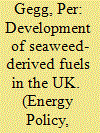

|
|
|
|
|
| Summary/Abstract |
Macroalgae (seaweed)-derived fuels are gaining increasing attention due to the high rate of seaweed growth, its lack of lignocellulose (which makes for energy-efficient processing), its lack of need for land or freshwater, and its potential suitability for commercial applications in the UK. However, while technological issues are progressively being solved, wider issues of stakeholder and public perception have largely been ignored, potentially hindering the development of this technology. This research fills this gap by conducting 19 interviews with stakeholders and 7 focus groups with members of the public to gain a deeper and broader understanding of perceptions of macroalgae-derived fuels. The results highlight the technological promise and confidence in the potential of macroalgae-derived fuels. However, they also emphasise conflicts and uncertainties among stakeholders (e.g. competition with other high-value products derived from macroalgae) and the general public (e.g. conflict with marine users). This paper provides insight into potential social resistance and key issues in the macroalgae-to-fuels supply chain. This information will enable two-way communication between everyone involved and increase the likelihood of successfully developing this supply chain. Key policy issues are discussed to facilitate this communication and encourage investment in the process.
|
|
|
|
|
|
|
|
|
|
|
|
|
|
|
|
| 5 |
ID:
114299


|
|
|
|
|
| Publication |
2012.
|
| Summary/Abstract |
Energy managers in public agencies are subject to multiple and sometimes conflicting policy objectives regarding cost, environmental, and security concerns associated with alternative energy technologies. Making infrastructure investment decisions requires balancing different distributions of risks and benefits that are far from clear. For example, managers at permanent Army installations must incorporate Congressional legislative objectives, executive orders, Department of Defense directives, state laws and regulations, local restrictions, and multiple stakeholder concerns when undertaking new energy initiatives. Moreover, uncertainty with regard to alternative energy technologies is typically much greater than that associated with traditional technologies, both because the technologies themselves are continuously evolving and because the intermittent nature of many renewable technologies makes a certain level of uncertainty irreducible. This paper describes a novel stochastic multi-attribute analytic approach that allows users to explore different priorities or weighting schemes in combination with uncertainties related to technology performance. To illustrate the utility of this approach for understanding conflicting policy or stakeholder perspectives, prioritizing the need for more information, and making investment decisions, we apply this approach to an energy technology decision problem representative of a permanent military base.
|
|
|
|
|
|
|
|
|
|
|
|
|
|
|
|
| 6 |
ID:
175907


|
|
|
|
|
| Summary/Abstract |
This article investigates empirical evidence from the Canadian oil and gas sector regarding the key factors behind corporate decision-making in moving from “business as usual” to tackling climate change. The findings are based on survey data from a sample of 127 managers. Logit regression analysis revealed that pressure from government, customers, suppliers and competitors increased the likelihood that firms will adopt a low-carbon strategy. Compared to other stakeholders, investors and employees may not be as strongly committed to adopting a climate change strategy. Media and corporate sustainability reporting were not found to be important factors in influencing firms to adopt low-carbon strategies, while command-and-control policies and firms’ perceptions of the risk of resource scarcity were factors that seemed to have the most influence on corporate decision-making. Multinational oil and gas firms headquartered in Canada appeared to be more likely to adopt low-carbon strategies than foreign multinational oil and gas firms. This research contributes to a better understanding of the key factors that affect corporate decision-making concerning GHG emission-reduction policies. Regulatory action based on significant engagement with affected stakeholders would appear to be particularly important in creating a broad base of support and pressure for action on climate change.
|
|
|
|
|
|
|
|
|
|
|
|
|
|
|
|
| 7 |
ID:
149879
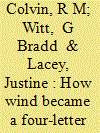

|
|
|
|
|
| Summary/Abstract |
Wind is recognised as a key source of renewable energy. Despite broad public support for the sector, wind energy proposals have routinely triggered social conflict and localised opposition. To promote social acceptance and avoid conflict, the wind energy sector undertakes community engagement. This paper interrogates the community engagement undertaken in King Island (Tasmania, Australia) for a large scale wind energy development proposal which did not proceed to implementation due to external economic factors. Despite the proponent's adoption of what was described as a ‘best practice’ community engagement strategy, the proposal caused significant social conflict for the community. In-depth interviews (n=30) were conducted with members of the King Island community and were qualitatively analysed through the social identity lens. Five key drivers of the local conflict were identified: problematic pre-feasibility engagement; the lack of a third-party facilitator of the community consultative committee; holding a vote which polarised the community; the lack of a clear place in the engagement process for local opposition, and; the significance of local context. These findings are instructive for improving community engagement practice for wind energy and other energy generation and land use change sectors.
|
|
|
|
|
|
|
|
|
|
|
|
|
|
|
|
| 8 |
ID:
125528


|
|
|
|
|
| Publication |
2013.
|
| Summary/Abstract |
Despite the substantial efforts made to develop sound energy efficiency policies, the desired effects in terms of achieved energy savings are lacking. This phenomenon is known as the energy efficiency gap and has been extensively investigated in the literature. Barrier models to explain the gap are primarily oriented towards the technical aspects of energy efficiency and often disregard its social aspects. The aim of our research was to identify the social structures that play a prominent role in moving society towards greater energy efficiency, to investigate their perceptions of the levers for and brakes to greater participation in the implementation of energy efficiency measures and to provide recommendations for policy enhancement. Four groups of stakeholders were identified: public institutions, businesses, civil society organisations and the media. A survey was administered to 93 representatives of these groups in Croatia. The results indicate that to encourage the society to adopt energy efficiency improvements, it is crucial for public institutions to play a leading role with the support of strong and visible political commitment. The level of benefit recognition among all groups is weak, which together with the slow progression of dialogue between and within the analysed groups is preventing full policy uptake.
|
|
|
|
|
|
|
|
|
|
|
|
|
|
|
|
| 9 |
ID:
099376
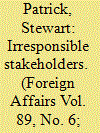

|
|
|
| 10 |
ID:
166973
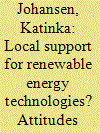

|
|
|
|
|
| Summary/Abstract |
This paper documents different attitudes towards local renewable energy technology (RET) projects in Denmark among two key RET stakeholder groups, permanent area residents (PRs) and second home owners (SHOs). It does so via survey data collected from almost 2000 respondents during a Danish near-shore wind farm tender. Judging by this data, local PRs are positive towards the planned local RETs, while SHOs are less so. This emphasizes that potential RET project stakeholders and stakeholder groups may have very different RET project perceptions and opinions. The planned RET projects were subject to widespread critique in the public and political RET project related debate, but the documented PR RET project support was rather silent support. This is a noteworthy inconsistency calling for further research. Drawing upon research insights from the interdisciplinary socially focused energy transitions body of literature, the paper suggests that particular uses of and attachments to particular places may inform stakeholder perceptions of RET related local change. The research findings have significant implications for RET planning, practice and policy more broadly.
|
|
|
|
|
|
|
|
|
|
|
|
|
|
|
|
| 11 |
ID:
128322
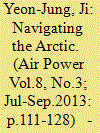

|
|
|
|
|
| Publication |
2013.
|
| Summary/Abstract |
For the next few decades, the Arctic will provide problems and prospects which may induce inevitable competition for the lion`s share among the stakeholders. While the arctic was perceived as an undiscovered area and a non-navigable ice cap in the past, recent environmental and scientific changes have brought to the fore the assets of the region. The current size of the ice cape has shrunk by more than 40 percent compared to its size in the late 1970s, which has disclosed an area of open water. The enlarged open water provides the opportunity to explore more economic benefits, and for larger marine and other military activities. The major stakeholders sharing the coastal line of the Arctic are eight states member of the Arctic Council: Canada, Denmark, Finland, Iceland, Norway, Russia, Sweden and the United States. Presently, these states are putting in their utmost efforts in to investigating and participating in exploring the Arctic, which will be the foundation of the legal claim for sovereignty.
|
|
|
|
|
|
|
|
|
|
|
|
|
|
|
|
| 12 |
ID:
124330


|
|
|
|
|
| Publication |
2013.
|
| Summary/Abstract |
There is wide agreement in the literature that non-technical factors play a decisive role in the successful implementation of bioenergy projects. One underlying reason is that such projects require the involvement of many stakeholders, such as feedstock producers, engineers, authorities and the concerned public. We analyze the role of bioenergy-specific non-technical factors for the success of bioenergy projects. In a broad literature review we first identify potential success factors belonging to the five dimensions project characteristics, policy framework, regional integration, public perception and stakeholders. Using these factors as conceptual framework, we next analyze six Japanese pilot projects for bioenergy utilization supported by Japans Agriculture, Forestry and Fisheries Research Council. We apply Rough Set Analysis, a data mining method that can be used for small sample sizes to identify patterns in a dataset. We find that, by and large, non-technical factors from all five dimensions - such as the stability of the local policy framework - co-occur with project success. Furthermore, we show that there are diverging interpretations as to what success in a bioenergy project means. This requires tradeoffs between various goals, which should be identified and addressed explicitly at early stages of such a project.
|
|
|
|
|
|
|
|
|
|
|
|
|
|
|
|
| 13 |
ID:
113434


|
|
|
|
|
| Publication |
2012.
|
| Summary/Abstract |
China has been building at least 50 gigawatt (GW) of new coal-fired power plants every year since 2004. In the absence of CO2 capture ready (CCR) designs, a large fraction of new coal power plants built in the next decade could face 'carbon lock-in'. Building on the existing engineering and economic literature on CO2 capture ready, the aim of this study is to understand the opportunities and challenges in implementing CCR in China. In early 2010, opinion-leaders perceptions towards implementing CCR in Guangdong with two empirical phases are presented: an online consultation of 31 respondents (out of a sample of 82), three face-to-face focus group discussions including 16 officials from five power plants and two oil companies in the Guangdong province. A majority of respondents in the online survey were engineers. The survey results are compared with an earlier study of stakeholders' views on demonstrating CCS in China, conducted in April 2009 as part of the EU-UK-China Near Zero Emissions Coal initiative (NZEC) project.
|
|
|
|
|
|
|
|
|
|
|
|
|
|
|
|
| 14 |
ID:
166553


|
|
|
|
|
| Summary/Abstract |
We explore how a community renewable energy enterprise may monitor and improve its functioning by using a quantitative model.
This model is designed to reflect the desired objectives of the community in terms of the overall returns to the enterprise's environmental, financial and social stakeholders. Since a community renewable energy enterprise is part of a broader class of small, social enterprises, based on local intention, action and control, the ideas on which this model is based may be useful to other similar firms.
|
|
|
|
|
|
|
|
|
|
|
|
|
|
|
|
| 15 |
ID:
171361


|
|
|
|
|
| Summary/Abstract |
Adoption of higher energy efficiency for electrical appliances by consumers in Sub-Saharan Africa (SSA) is challenged with a number of barriers despite its long term energy savings and economic benefits. Inefficient electrical appliances continue to flood the markets of most SSA countries with just a few of the counties having resolute energy efficiency programs with established energy efficiency standards and labels. This paper examines the barriers to energy efficiency in SSA, with a case study on how Ghana was able to overcome these barriers by using high levels of stakeholder engagement to develop and implement its energy efficiency standards and labels for electrical appliances.
Analysis from this study reveals that the Ghana policy development process is consistent with a quadruple helix model of policy and marketplace innovation. The quadruple-helix analytical framework identifies four key sectors of society: government, academia, industry and public/media that drive energy efficiency knowledge and innovations. The resulting barrier removal and institutional transformations enabled by the quadruple-helix dynamics have laid the foundation for a dramatic expansion of Ghanaian energy efficiency policy-making. New energy efficiency policies in Ghana are expected to revise or implement new efficiency standards on a total of 20 product categories by 2022.
|
|
|
|
|
|
|
|
|
|
|
|
|
|
|
|
| 16 |
ID:
137690
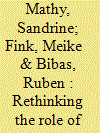

|
|
|
|
|
| Summary/Abstract |
This article considers the usefulness of low-carbon scenarios in public decision-making. They may be useful as a product-oriented trajectory. The scenarios on the agenda of the 2013 Energy Debate in France belong to this category. But a scenario may also be process-oriented, in the sense that its scripting process helps build consensus and a minimum level of agreement. We have scripted scenarios using a codevelopment method, involving about 40 stakeholders from the private and public sectors, and from the state: NGOs, consumer groups, trade unions, banks and local authorities. They selected policies they considered acceptable for achieving 75% greenhouse gases emission reductions in 2050. These policies were then integrated in the Imaclim-R-France technico-economic simulation model, as part of a high or moderate acceptability scenario. In the first case emissions were cut by between 58% and 72% by 2050; in the second case by between 68% and 81%, depending on the energy price assumptions. All these measures benefited jobs and economic growth, swiftly and durably cutting household spending on energy services. This offers a solid basis for gaining acceptability for low carbon trajectories; the process constitutes also a framework for consolidating collective learning centering on the acceptability of climate policies.
|
|
|
|
|
|
|
|
|
|
|
|
|
|
|
|
| 17 |
ID:
111844


|
|
|
|
|
| Publication |
2012.
|
| Summary/Abstract |
How do property rights become secure? How does rule of law take hold in an economy? The author uses an original survey of 516 firms in Russia and Ukraine, as well as interview-based case studies, to reexamine these fundamental issues of political economy. Most states in the developing world lack the requisite time horizons and institutional capacity to make the credible commitments emphasized in the literature. In this context, the author argues that firms can enforce their property rights without resort to mafias by forming alliances with stakeholders such as foreign actors, community residents, and labor. These stakeholders can impose costs on the potential aggressors through diverse political strategies, allowing firms to defend their property rights not only from private predators but also from the state. The article evaluates this "bottom-up" theory of secure property rights against existing state-based theorizing.
|
|
|
|
|
|
|
|
|
|
|
|
|
|
|
|
| 18 |
ID:
178832


|
|
|
|
|
| Summary/Abstract |
The Taiwan government has initiated multiple renewable energy development projects in recent years, one of which involved the use of photovoltaics (PVs) as a source of renewable energy. Given the limited land resources in Taiwan, the government introduced an aquavoltaics policy that was aimed at slowing the reduction in aquaculture production and increasing non-farming production benefits for small-scale aquaculture farmers without compromising the country's industrial development. However, when this policy took effect, landowners began exploiting fishpond areas, which adversely impacted fishpond prices and preyed on farmers, tenants, and the environment, in addition to affecting the sustainable development of aquaculture. To meet the research purpose, this study explores, assesses, and analyses the effects of the aquavoltaics policy on Taiwan's aquaculture industry. The results show that different stakeholders had dissimilar views on the aquavoltaics policy. The research findings are expected to expedite the integration of different opinions with the implementation of renewable energy policies. The government sector should also effectively communicate the aquavoltaics policy to various stakeholders and help them to adopt the policy to reduce operational risks for aquaculture farmers and simultaneously facilitate the sustainable development of aquaculture and thereby make Taiwan's small-scale aquaculture farming system a model of energy transition.
|
|
|
|
|
|
|
|
|
|
|
|
|
|
|
|
| 19 |
ID:
099263
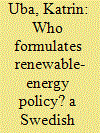

|
|
|
|
|
| Publication |
2010.
|
| Summary/Abstract |
A broad participation by stakeholders and an extensive reliance on expert advice are often seen as preconditions for a legitimate and successfully implemented renewable energy policy. However, we have lacked systematic data for testing this argument. This article's contribution is to examine the actors who take part in the making of Swedish energy policy with the help of data on the composition of various committees of inquiry over the last twenty years (1988-2009). Swedish renewable energy policy is often characterised with words like "pioneering" and "forerunner", suggesting that the policy-making process in this area engages many different experts and stakeholders. Our data give only some support to this argument. Results point to a noteworthy predominance of politicians, civil servants, and representatives of state agencies within the policy-process. Producers of uranium and fossils based energy have been engaged more often than producers of renewable energy. Experts have played a prominent role, but this is mostly due to the participation of expert bureaucrats rather than of scientists. The study suggests that a better understanding of the making of energy policy, both in Sweden and elsewhere, requires greater attention to the networks and role of various state employees.
|
|
|
|
|
|
|
|
|
|
|
|
|
|
|
|
|
|
|
|
|